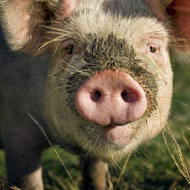NPA issues complaint over Amazon swill feeding advert

“A company as big and influential as Amazon has a huge responsibility to make sure that its customers are informed correctly" - Duncan Berkshire, Pig Veterinary Society.
The National Pig Association (NPA) has issued a complaint to the Advertising Standards Authority (ASA) about an advert for Amazon’s Echo Dot.
The advert is being shown in cinemas across the UK and features a small boy with his pet pig. During the commercial, the boy gives the pig leftovers from his dinner plate.
In her complaint to the APA, NPA chief executive Zoe Davis points out that this is classed as swill feeding - a practice banned in the UK since the 2001 Foot and Mouth Disease (FMD) outbreak.
With the UK on high-alert for African Swine Fever - which, like FMD, can be spread via infected meat - she calls on the ASA to pull the advert and to keep ‘ASF and other awful notifiable diseases out of the UK pig population.’
“What really concerns us, is not just the fact that the ad appears to encourage an illegal act, but the fact that we have another disease spreading through the EU, all over China and several other Asian countries called African swine fever,” Zoe writes.
“We do not have the disease in the UK and we are working really hard with other industry groups and the government to try and keep it out by attempting to educate the public about the illegality and the risk of feeding kitchen scraps to pigs.”
She continued: “This advert undermines all those efforts and because of the advertising budget, will be seen by a much wider audience. We also have a large smallholder and pet pig community in the UK and we know from studies that feeding kitchen scraps, despite being illegal is still practised, so the risk is already present.”
Her words were echoed by vet Duncan Berkshire of the Pig Veterinary Society, who also complained to the ASA about the advert.
He said: “There are huge efforts coming from the pig sector and Government to make people, especially unsuspecting members of the public with small holdings and pet pigs, aware of the risks that this practice puts the UK pig population at, along with making them aware that they are breaking the law.
“A company as big and influential as Amazon has a huge responsibility to make sure that its customers are informed correctly and you have made a big mistake here, portraying something that is illegal in an advert that will be aimed to be watched by potentially millions of people.”



 The veterinary mental health charity Vetlife is inviting the veterinary community to join it for a sponsored cold-water dip.
The veterinary mental health charity Vetlife is inviting the veterinary community to join it for a sponsored cold-water dip.